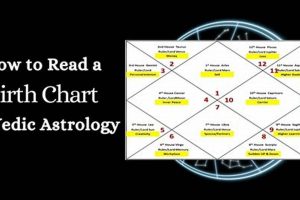In Vedic astrology, Shani, often equated with the Roman god Saturn, represents karma, discipline, and time. This celestial body governs structure, limitations, and lessons learned through experience. A prominent placement might manifest as delays, hardships, or responsibilities, pushing individuals toward self-improvement and spiritual growth. For example, Shani’s influence in the tenth house could indicate a career path involving hard work and perseverance, leading to eventual success through sustained effort.
This graha’s placement in a birth chart provides valuable insight into an individual’s strengths, weaknesses, and karmic debts. Understanding its influence can help navigate life’s challenges with greater awareness and resilience. Historically, Shani has been revered and feared, symbolizing the inevitable consequences of actions. Its lessons, while often difficult, are considered essential for spiritual evolution and the attainment of wisdom. By understanding its energy, individuals can transform limitations into opportunities for growth.
Further exploration will delve into Shani’s influence in different houses, its aspects with other planets, and the various remedies employed to mitigate its challenging effects. This knowledge empowers individuals to harness this powerful planet’s energy for personal transformation and fulfillment.
These practical tips offer guidance for mitigating potential challenges and harnessing the transformative power of Shani.
Tip 1: Cultivate Discipline: Regular routines, punctuality, and commitment to responsibilities can alleviate Shani’s restrictive influence. Consistent effort in career or personal projects yields positive outcomes.
Tip 2: Practice Patience: Delays and obstacles are often associated with Shani. Cultivating patience minimizes frustration and allows for strategic planning amidst challenges.
Tip 3: Embrace Hard Work: Shani rewards diligence and perseverance. Dedication to tasks, even mundane ones, fosters growth and resilience.
Tip 4: Act with Integrity: Ethical conduct and adherence to moral principles minimize negative karmic repercussions. Honest dealings in all aspects of life are crucial.
Tip 5: Learn from Experiences: Shani’s lessons are often delivered through challenging experiences. Reflecting on these lessons fosters wisdom and personal evolution.
Tip 6: Practice Humility: Acknowledging limitations and seeking guidance when needed mitigates Shani’s harsh effects. Humility allows for continuous learning and growth.
Tip 7: Develop Spiritual Practices: Meditation, yoga, and contemplative practices can enhance resilience and foster inner peace, providing strength during difficult periods.
By incorporating these practices, individuals can navigate life’s challenges with greater resilience and transform limitations into opportunities for growth and self-discovery.
These insights offer a foundation for understanding Shani’s profound influence and utilizing its energy for positive transformation. The subsequent conclusion will summarize key principles and offer further guidance for applying this knowledge.
1. Karma
Within Vedic astrology, Saturn embodies the principle of karma, acting as the cosmic record keeper and administrator of karmic consequences. Understanding this connection provides crucial insight into the unfolding of one’s life path and the lessons presented by Saturn’s influence.
- The Law of Cause and Effect
Saturn represents the law of cause and effect, emphasizing that actions, thoughts, and intentions generate corresponding results. Past actions manifest as present circumstances, shaping experiences and influencing future outcomes. Saturn’s placement in a birth chart illuminates areas where past karmas may influence present life, highlighting potential challenges or opportunities for growth. For example, a debilitated Saturn might indicate past karmic debts requiring attention in the current life.
- Responsibility and Accountability
Saturn emphasizes personal responsibility and accountability. Its influence encourages individuals to acknowledge the consequences of their actions and take ownership of their lives. Shani’s restrictive energy often manifests as limitations or challenges, prompting individuals to confront past actions and make amends where necessary. This process fosters personal growth and karmic resolution.
- Learning and Growth Through Challenges
Challenges and obstacles presented by Saturn are not viewed as punishments, but rather as opportunities for learning and growth. Shani’s influence encourages patience, perseverance, and self-reflection, enabling individuals to transform limitations into catalysts for positive change. By navigating difficulties with integrity and resilience, individuals evolve spiritually and mitigate future karmic repercussions.
- Time and Manifestation
Saturn governs time, signifying the gradual unfolding of karmic consequences. While some karmic results might manifest immediately, others might take time to materialize. Saturn teaches patience and detachment, emphasizing the importance of consistent effort and right action over immediate gratification. Delayed gratification, a common theme associated with Saturn, underscores the concept that sustained effort eventually yields desired results.
By comprehending the interconnectedness of karma and Saturn within Vedic astrology, individuals gain a deeper understanding of their life experiences and the opportunities for growth presented by challenges. This knowledge empowers individuals to navigate life’s complexities with greater awareness and purpose, ultimately transforming karmic burdens into stepping stones toward spiritual evolution.
2. Discipline
Within Vedic astrology, Saturn signifies discipline, emphasizing structure, order, and adherence to commitments. This planet’s influence encourages individuals to cultivate self-control, perseverance, and a strong work ethic. Understanding Saturn’s connection to discipline provides valuable insight into personal growth and karmic evolution.
- Structure and Routine
Saturn governs structure and routine, promoting regularity and consistency in daily life. This influence manifests as a preference for established schedules, organized environments, and systematic approaches to tasks. Examples include adhering to a daily work schedule, maintaining a tidy living space, or following a consistent exercise regimen. These structured practices foster stability, efficiency, and a sense of control, mitigating potential chaos associated with a lack of discipline.
- Perseverance and Resilience
Saturn encourages perseverance and resilience in the face of challenges. Its influence fosters a strong work ethic, enabling individuals to overcome obstacles and achieve long-term goals. Examples include persisting through difficult projects at work, maintaining a commitment to long-term fitness goals, or continuing education despite setbacks. This resilience builds character and strengthens resolve, leading to eventual success through sustained effort.
- Self-Control and Restraint
Saturn promotes self-control and restraint, emphasizing moderation and delayed gratification. This influence helps individuals resist impulsive behaviors and cultivate patience. Examples include managing finances responsibly, adhering to a healthy diet, or practicing emotional regulation in challenging situations. This self-mastery fosters inner peace and reduces negative consequences arising from impulsive actions.
- Time Management and Efficiency
Saturn governs time, emphasizing its value and the importance of efficient utilization. Its influence encourages individuals to prioritize tasks, manage time effectively, and avoid procrastination. Examples include creating schedules, setting deadlines, and delegating responsibilities when necessary. This efficient approach maximizes productivity and reduces stress associated with poor time management.
By cultivating discipline in these areas, individuals align themselves with Saturn’s constructive influence, fostering personal growth, karmic progress, and a sense of stability in life. This understanding empowers individuals to harness Saturn’s energy for self-improvement and achieve long-term goals through consistent effort and mindful action.
3. Time
Within Vedic astrology, Saturn’s association with time governs the unfolding of karma, the maturation process, and the concept of delayed gratification. This connection emphasizes the importance of patience, perseverance, and long-term vision. Understanding Saturn’s influence on time provides valuable insight into personal growth, karmic cycles, and the achievement of long-term goals.
- Delayed Gratification
Saturn’s influence often manifests as delays and obstacles, emphasizing the importance of patience and perseverance. Success under Saturn’s influence rarely comes quickly; it requires sustained effort and a willingness to work through challenges. For example, career advancement might require years of dedicated work, or a stable relationship might develop slowly over time. This principle of delayed gratification teaches the value of long-term vision and the importance of consistent effort over immediate results.
- Karmic Cycles
Saturn governs karmic cycles, signifying the unfolding of karmic consequences over time. Past actions, both positive and negative, manifest as present circumstances, shaping experiences and influencing future outcomes. These cycles can span lifetimes, highlighting the importance of learning from past experiences and making conscious choices in the present. Saturn’s return, occurring approximately every 29.5 years, marks a significant period of karmic reckoning and reassessment.
- Maturation and Wisdom
Saturn’s influence fosters maturation and wisdom through life experiences. Challenges and obstacles, often perceived as difficult or restrictive, serve as valuable lessons, promoting personal growth and self-awareness. Over time, these experiences cultivate resilience, patience, and a deeper understanding of oneself and the world. Saturn’s influence encourages individuals to learn from their mistakes and evolve into wiser, more mature versions of themselves.
- Long-Term Vision and Planning
Saturn’s connection to time emphasizes the importance of long-term vision and planning. Its influence encourages individuals to think beyond immediate gratification and consider the long-term consequences of their actions. This perspective fosters strategic thinking, prudent decision-making, and a focus on building a stable foundation for the future. Examples include long-term financial planning, career development strategies, and building lasting relationships based on mutual respect and understanding.
By understanding Saturn’s influence on time, individuals can navigate life’s challenges with greater patience and resilience. This awareness empowers individuals to embrace delayed gratification, learn from karmic cycles, and cultivate a long-term vision, ultimately leading to personal growth, karmic progress, and the fulfillment of long-term goals. Saturn’s lessons, while often challenging, ultimately serve as catalysts for profound transformation and the attainment of wisdom.
4. Responsibility
In Vedic astrology, Saturn embodies the principle of responsibility, emphasizing accountability, duty, and the consequences of actions. This planet’s influence compels individuals to confront their obligations and fulfill their karmic debts. Understanding Saturn’s connection to responsibility provides valuable insight into personal growth, karmic lessons, and the development of maturity.
- Duty and Obligation
Saturn highlights the importance of fulfilling duties and obligations, both personal and societal. This can manifest as responsibilities towards family, work, community, or even oneself. Examples include providing for family members, meeting work deadlines, adhering to social norms, or maintaining personal health. Saturn’s influence emphasizes that neglecting these duties can lead to consequences, prompting individuals to take ownership of their responsibilities and contribute meaningfully to their spheres of influence.
- Accountability and Consequences
Saturn emphasizes accountability for one’s actions, highlighting the karmic principle of cause and effect. This planet’s influence underscores that actions have consequences, both positive and negative. Saturn encourages individuals to acknowledge the impact of their choices and take responsibility for the outcomes. This understanding fosters a sense of ownership and encourages mindful decision-making, aligning actions with ethical principles and karmic responsibility.
- Discipline and Self-Mastery
Responsibility requires discipline and self-mastery. Saturn’s influence encourages individuals to cultivate self-control, perseverance, and a strong work ethic to fulfill their obligations. This can involve managing time effectively, resisting impulsive behaviors, and prioritizing responsibilities over immediate gratification. Saturn’s lessons often involve delayed gratification, teaching the value of sustained effort and the long-term benefits of responsible action.
- Maturity and Reliability
Saturn’s influence fosters maturity and reliability, qualities essential for shouldering responsibilities effectively. Through facing challenges and fulfilling obligations, individuals develop resilience, patience, and a sense of dependability. This maturation process often involves learning from mistakes and taking ownership of one’s shortcomings. Saturn’s lessons, while sometimes difficult, ultimately contribute to personal growth and the development of a strong, responsible character.
By embracing the lessons of responsibility embodied by Saturn, individuals cultivate integrity, resilience, and a deep understanding of their role within the larger karmic framework. This acceptance of responsibility allows individuals to navigate life’s challenges with greater awareness and purpose, transforming potential burdens into opportunities for growth, karmic progress, and the development of a mature, responsible self. This ultimately contributes to a more fulfilling and meaningful life, aligned with the principles of dharma and karmic evolution as understood within Vedic astrology.
5. Limitations
Within Vedic astrology, Saturn represents limitations, often manifesting as boundaries, restrictions, and delays. These limitations, while potentially challenging, serve as crucial catalysts for growth, discipline, and karmic development. Understanding Saturn’s influence in this context provides valuable insight into navigating life’s obstacles and transforming perceived limitations into opportunities for self-improvement.
- Boundaries and Restrictions
Saturn defines boundaries, creating structure and limitations within various life areas. These boundaries, while sometimes perceived as restrictive, provide a framework for focused effort and disciplined action. For example, limited resources might necessitate careful budgeting and resource allocation, leading to greater financial responsibility. Similarly, physical limitations can encourage the development of alternative skills and strengths. These restrictions, though challenging, ultimately foster resilience and resourcefulness.
- Delays and Obstacles
Saturn’s influence often manifests as delays and obstacles in achieving goals. These delays, while potentially frustrating, encourage patience, perseverance, and strategic planning. For example, a delayed career advancement might prompt further skill development and networking, ultimately leading to a more fulfilling and well-deserved promotion. Obstacles in relationships can highlight areas needing attention, fostering communication and deeper understanding. Saturn’s delays, though testing patience, ultimately refine character and ensure long-term success.
- Karmic Lessons and Growth
Saturn’s limitations often reflect karmic lessons needing attention. These challenges provide opportunities for growth, self-reflection, and karmic resolution. Facing limitations with awareness and responsibility allows individuals to learn from past actions and make amends where necessary. For example, financial difficulties might stem from past financial mismanagement, prompting greater financial responsibility and wiser resource allocation. Relationship challenges might highlight karmic patterns needing resolution, leading to greater self-awareness and healthier relationship dynamics. Saturn’s limitations, when viewed through a karmic lens, become valuable opportunities for growth and evolution.
- Discipline and Self-Mastery
Navigating Saturn’s limitations requires discipline and self-mastery. Developing these qualities enables individuals to overcome obstacles, manage restrictions effectively, and transform limitations into strengths. Cultivating patience, perseverance, and a strong work ethic empowers individuals to navigate delays and setbacks constructively. Saturn’s influence encourages self-reflection, prompting individuals to examine their limitations honestly and develop strategies for self-improvement. This process fosters resilience, self-reliance, and a deep understanding of one’s potential.
Saturn’s influence, while often associated with hardship, ultimately serves as a powerful catalyst for personal growth and karmic evolution. By understanding and accepting limitations as opportunities for learning and self-improvement, individuals can harness Saturn’s energy to cultivate discipline, resilience, and a deeper understanding of their karmic path. This awareness empowers individuals to transform perceived limitations into stepping stones toward a more fulfilling and meaningful life, aligned with the principles of dharma and karmic responsibility as understood within Vedic astrology.
6. Structure
Within Vedic astrology, Saturn represents structure, signifying order, discipline, and the frameworks that shape experience. This planet’s influence emphasizes the importance of established systems, routines, and boundaries in creating stability and facilitating long-term growth. Understanding Saturn’s connection to structure provides valuable insight into navigating life’s complexities and achieving lasting success.
- Foundations and Stability
Saturn governs foundations, emphasizing the importance of building a stable base upon which to build one’s life. This can manifest in various areas, such as establishing a secure financial foundation, developing strong family ties, or creating a stable career path. Saturn’s influence encourages careful planning, disciplined effort, and a long-term perspective, ensuring that efforts are grounded in solid foundations. For example, Saturn in the fourth house might emphasize the importance of family stability and creating a secure home environment.
- Systems and Order
Saturn promotes order and systematization, encouraging the implementation of structured routines and organized systems. This can manifest as a preference for established procedures, organized workspaces, and structured daily routines. Saturn’s influence helps individuals manage time effectively, prioritize tasks, and achieve goals through methodical approaches. For example, individuals influenced by Saturn might excel in fields requiring meticulous attention to detail, such as accounting, engineering, or law.
- Boundaries and Limitations
Saturn defines boundaries, establishing limitations that shape experiences and provide a framework for focused effort. While often perceived as restrictive, these boundaries provide structure and direction. For example, budgetary constraints can encourage responsible financial management, leading to long-term financial security. Time limitations necessitate prioritization and efficient time management. Saturn’s boundaries, while sometimes challenging, ultimately foster discipline and resourcefulness.
- Long-Term Vision and Planning
Saturn’s influence encourages long-term vision and planning, emphasizing the importance of delayed gratification and sustained effort. This planet’s connection to structure facilitates strategic thinking, prompting individuals to consider the long-term consequences of their actions. For example, Saturn’s influence might encourage individuals to invest in long-term career development, build lasting relationships based on mutual respect, or create a comprehensive financial plan for retirement. This long-term perspective, fostered by Saturn’s emphasis on structure, contributes to lasting success and stability in life.
Saturn’s influence on structure within Vedic astrology provides a framework for navigating life’s complexities and achieving long-term goals. By embracing discipline, order, and a long-term perspective, individuals can harness Saturn’s energy to build stable foundations, manage resources effectively, and create a life of purpose and fulfillment. Understanding and working with Saturn’s influence on structure empowers individuals to transform potential limitations into opportunities for growth and achieve lasting success aligned with their karmic path.
7. Growth
Within Vedic astrology, Saturn’s association with growth paradoxically arises from its connection to limitations, challenges, and karmic lessons. Growth, in this context, is not about unbridled expansion but rather a gradual, structured development forged through discipline, perseverance, and the integration of life experiences. Saturn’s influence fosters resilience, self-awareness, and a deep understanding of one’s karmic path, ultimately leading to profound personal transformation.
Saturn’s limitations act as catalysts for growth by forcing individuals to confront weaknesses, develop resilience, and cultivate resourcefulness. For instance, a challenging career path governed by Saturn might initially lead to setbacks and frustrations. However, these experiences can motivate individuals to enhance their skills, refine their strategies, and ultimately achieve a level of mastery unattainable through easier routes. Similarly, relationship challenges influenced by Saturn can highlight areas needing attention, fostering deeper communication, empathy, and stronger bonds. Saturnian growth emphasizes the importance of learning from mistakes, taking responsibility for actions, and using challenges as opportunities for self-improvement. This process often involves delayed gratification, where consistent effort and patience yield substantial rewards in the long term.
The practical significance of understanding Saturn’s connection to growth lies in its ability to reframe challenges as opportunities for evolution. By accepting limitations and embracing the lessons embedded within difficult experiences, individuals can harness Saturn’s energy for positive transformation. This understanding fosters resilience in the face of adversity, encourages self-reliance, and promotes a long-term vision aligned with one’s karmic path. Saturnian growth, while often arduous, ultimately leads to a deeper understanding of oneself, a stronger sense of purpose, and a more meaningful life grounded in wisdom and karmic maturity.
Frequently Asked Questions about Saturn in Vedic Astrology
This section addresses common inquiries regarding Saturn’s influence in Vedic astrology, providing concise and informative responses.
Question 1: Does Saturn always indicate negative outcomes?
Saturn does not inherently signify negative outcomes. While often associated with challenges and limitations, Saturn’s influence ultimately promotes growth, discipline, and karmic progress. Its placement and aspects in a birth chart reveal areas requiring effort and patience, ultimately leading to long-term rewards and spiritual development.
Question 2: How does Saturn’s placement in different houses affect its influence?
Saturn’s house placement signifies the area of life where its lessons and influence are most prominent. For example, Saturn in the tenth house focuses on career and public image, often involving hard work and delayed recognition. Saturn in the seventh house might indicate delays in marriage or partnerships but ultimately emphasizes the importance of commitment and stability.
Question 3: What are the remedies for mitigating Saturn’s challenging effects?
Remedies in Vedic astrology aim to harmonize planetary influences. For Saturn, remedies might include disciplined routines, acts of service, spiritual practices like meditation and mantra recitation, and gemstone recommendations. These practices aim to strengthen character, cultivate patience, and align oneself with Saturn’s constructive energy.
Question 4: How does Saturn’s period (Sade Sati) impact an individual’s life?
Sade Sati, a seven-and-a-half-year period when Saturn transits through the 12th, 1st, and 2nd houses from the natal moon, often brings significant life changes and challenges. These challenges, while potentially difficult, serve as karmic tests and opportunities for growth. Understanding Saturn’s influence during this period can help individuals navigate these transitions with greater awareness and resilience.
Question 5: How does Saturn interact with other planets in a birth chart?
Saturn’s aspects with other planets modify its influence. Beneficial aspects can enhance Saturn’s positive qualities, such as discipline and perseverance, while challenging aspects might amplify its restrictive tendencies. Understanding these interactions provides a more nuanced understanding of Saturn’s impact on an individual’s life.
Question 6: How can one harness Saturn’s energy for positive transformation?
Harnessing Saturn’s energy involves cultivating discipline, patience, and a willingness to learn from challenges. Embracing responsibility, acting with integrity, and focusing on long-term goals aligns individuals with Saturn’s constructive influence, fostering personal growth, karmic progress, and a deeper sense of purpose.
Understanding Saturn’s complex influence provides valuable insights into one’s karmic path and potential for growth. By embracing its lessons and working with its energy constructively, individuals can navigate life’s challenges with greater resilience and achieve lasting fulfillment.
Further exploration of specific chart placements, transits, and remedial measures can provide a more personalized understanding of Saturn’s influence. Consulting with an experienced Vedic astrologer can offer valuable guidance in this process.
Saturn in Vedic Astrology
Exploration of this celestial body reveals its multifaceted influence encompassing karma, discipline, time, responsibility, limitations, structure, and growth. Representing karmic accountability and the unfolding of consequences over time, Shani compels individuals toward disciplined action, structured routines, and acceptance of limitations as catalysts for growth. These facets intertwine, shaping individual experiences and prompting introspection, ultimately fostering resilience, wisdom, and karmic progress. Shani’s influence, while demanding, ultimately guides individuals toward a deeper understanding of themselves and their place within the cosmic order.
Navigating life with awareness of Shani’s profound influence empowers individuals to transform perceived limitations into opportunities for growth and self-mastery. Embracing responsibility, cultivating patience, and maintaining a long-term vision allows one to harness Shani’s energy constructively, leading to a life of purpose, resilience, and karmic fulfillment. Deeper exploration through personalized chart analysis and consultation with experienced Vedic astrologers offers further insights into this complex and transformative planetary influence.







